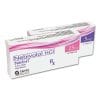Telmisartan Tablet | An Angiotensin Receptor Blocker
Introduction
Telmisartan available under the brand names of Telsarta, Misar, Talam etc. is a prescription drug used to treat high blood pressure (hypertension). It is an angiotensin receptor blocker (ARB) that works by blocking the action of a hormone called angiotensin II, which constricts blood vessels and raises blood pressure. Telmisartan is available in tablet form and is commonly marketed under the brand name Micardis.
In this article, we will discuss the uses, machanism of action, dosage, side effects, precautions, and interactions of Telmisartan tablets.
Mechanism of action
Telmisartan binds reversibly and selectively to the receptors in vascular smooth muscle and the adrenal gland, interfering with the binding of angiotensin II to the angiotensin II AT1-receptor. Blocking the effects of angiotensin II lowers systemic vascular resistance because it is a vasoconstrictor that also increases aldosterone synthesis and release. The angiotensin converting enzyme, other hormone receptors, or ion channels are not inhibited by telmisartan.5 Additionally, studies indicate that telmisartan is a partial agonist of PPAR, a known target for anti-diabetic medications. This shows that telmisartan can reduce insulin resistance and enhance carbohydrate and lipid metabolism without having the negative effects of complete PPAR activators.
Uses
Telmisartan is primarily used to treat hypertension. It can be used alone or in combination with other drugs, such as diuretics, to lower blood pressure. Lowering blood pressure can help reduce the risk of strokes, heart attacks, and kidney problems.
In addition to treating hypertension, Telmisartan may also be used to treat other conditions, such as heart failure and diabetic kidney disease. It may also help reduce the risk of cardiovascular events in patients with a high risk of developing them.
Dosage
Telmisartan tablets come in various strengths, including 20mg, 40mg, and 80mg. The recommended dosage of Telmisartan varies depending on the patient’s age, medical history, and the severity of their condition.
For adults with hypertension, the usual starting dose is 40mg once daily. The dosage may be increased to 80mg once daily, depending on the patient’s response to the drug. If the patient’s blood pressure is not adequately controlled with Telmisartan alone, a diuretic may be added to the treatment.
For patients with heart failure, the recommended starting dose is usually 40mg once daily. The dose may be increased to 80mg once daily, depending on the patient’s response to the drug.
For patients with diabetic kidney disease, the recommended starting dose is usually 80mg once daily.
It is important to follow your doctor’s instructions regarding the dosage and administration of Telmisartan tablets. Do not increase or decrease your dosage without consulting your doctor.
Side Effects
Like all medications, Telmisartan may cause side effects in some patients. Common side effects of Telmisartan include:
- Dizziness
- Headache
- Fatigue
- Diarrhea
- Nausea
- Upper respiratory tract infections
These side effects are usually mild and go away on their own after a few days or weeks. However, if these side effects persist or worsen, contact your doctor.
In rare cases, Telmisartan may cause more serious side effects, such as:
- Allergic reactions, such as rash, itching, or swelling of the face, lips, tongue, or throat
- Severe dizziness or fainting
- Jaundice (yellowing of the skin or eyes)
- Kidney problems, such as decreased urine output or swelling of the feet or ankles
- Liver problems, such as abdominal pain, nausea, or jaundice
- Vision problems, such as blurred vision or loss of vision in one or both eyes
If you experience any of these side effects, seek medical attention immediately.
Precautions
Before taking Telmisartan tablets, inform your doctor if you have any of the following conditions:
- Kidney disease
- Liver disease
- Heart disease
- High levels of potassium in your blood
- Dehydration or low blood volume
- Pregnancy or breastfeeding
Telmisartan may not be suitable for some patients with these conditions, or the dosage may need to be adjusted.
Telmisartan may also interact with other medications, including:
- Other blood pressure medications
- Potassium supplements or salt substitutes containing potassium
- Nonsteroidal anti-inflammatory drugs (NSA
- Nonsteroidal anti-inflammatory drugs (NSAIDs)
- Lithium
- Diuretics
- Antidiabetic medications
Telmisartan may also cause dizziness, especially when standing up quickly from a sitting or lying position. To avoid falls or injuries, get up slowly and steady yourself before standing.
Alcohol may also worsen the side effects of Telmisartan, such as dizziness or lightheadedness. It is recommended to limit alcohol consumption while taking this medication.
Pregnant women should avoid taking Telmisartan as it may harm the developing fetus. It is important to inform your doctor if you become pregnant while taking Telmisartan. It is also not recommended to breastfeed while taking Telmisartan, as it may pass into breast milk and harm the nursing infant.
Interactions
Telmisartan may interact with other medications, including prescription drugs, over-the-counter medications, and herbal supplements. It is important to inform your doctor of all medications you are taking, including:
- Other blood pressure medications, such as ACE inhibitors or beta-blockers
- Potassium supplements or salt substitutes containing potassium
- Nonsteroidal anti-inflammatory drugs (NSAIDs)
- Lithium
- Diuretics
- Antidiabetic medications
These medications may interact with Telmisartan, increasing the risk of side effects or reducing the effectiveness of the medication. Your doctor may need to adjust your dosage or recommend an alternative medication.
Conclusion
Telmisartan is a prescription medication used to treat hypertension, heart failure, and diabetic kidney disease. It is an angiotensin receptor blocker that works by blocking the action of a hormone called angiotensin II, which constricts blood vessels and raises blood pressure.
Telmisartan tablets come in various strengths, and the dosage depends on the patient’s age, medical history, and the severity of their condition. It is important to follow your doctor’s instructions regarding the dosage and administration of Telmisartan tablets.
Like all medications, Telmisartan may cause side effects in some patients. Common side effects include dizziness, headache, fatigue, diarrhea, nausea, and upper respiratory tract infections. In rare cases, Telmisartan may cause more serious side effects, such as allergic reactions, severe dizziness or fainting, liver or kidney problems, and vision problems.
Before taking Telmisartan, inform your doctor if you have any medical conditions or are taking any medications. Telmisartan may interact with other medications, increasing the risk of side effects or reducing the effectiveness of the medication.
Overall, Telmisartan is an effective medication for treating hypertension and related conditions. However, it is important to follow your doctor’s instructions and report any side effects or concerns.



